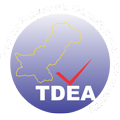Fayyaz-ul-Islam, a 38-year-old pharmaceutical representative-turned-development practitioner, has built the capacity of local communities in Mardan district to seek information from government departments under the Khyber Pakhtunkhwa Right to Information (RTI) Act 2013, leading to marked improvements in social service delivery.
One of the primary reasons for irregularities by public officials in Khyber Pakhtunkhwa province was citizens’ lack of access to information that affected their lives. On the one hand, the lack of information created disconnect between citizens and public bodies; while, on the other, it incentivized corruption.

The Khyber Pakhtunkhwa Right to Information Commission was established in 2013 to safeguard the constitutional right of citizens to access information of public importance, thereby affording them an opportunity to play their role in improving governance. However, the situation on the ground did not drastically change because the majority of citizens had little or no knowledge of the law and the window of opportunity it opened against corruption. Therefore, it comes as no surprise that only 290 requests were filed with the RTI commission in the first year.
“I did not even know that citizens have a right to access public information until I attended the USAID-funded training workshops on the Khyber Pakhtunkhwa RTI Act,” Fayyaz says. These workshops – organized by the Centre for Governance and Public Accountability (CGPA), a Peshawar-based NGO funded by USAID Citizens’ Voice Project under Grants Cycle 7 thematic area ‘Citizens’ Voice for Strengthening Accountability and Transparency Mechanisms’ – proved to be a turning point for Fayyaz since he realized the potential of the RTI law and dedicated his energies to publicizing it at the grassroots level.
Acknowledging his interest and potential, CGPA tasked Fayyaz to conduct community awareness-raising sessions on the RTI law in five union councils of Mardan district. These sessions provided Fayyaz with an opportunity to share the benefits of the RTI law with community members and enable them to file information requests for improved functioning of public departments. “I told them it is our right to demands the details of resource allocation and expenditure from government officials.”




















